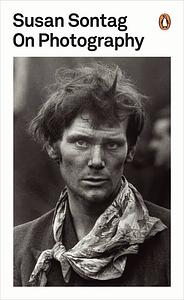You need to sign in or sign up before continuing.
Take a photo of a barcode or cover
Incredibly boring and overwritten to the point of being incomprehensible at times.
emotional
hopeful
informative
inspiring
reflective
relaxing
medium-paced
really great book analyzing the history of photography and the effect that this seemingly new field is having within society. strongly opinionated and well written each essay expounds upon the central point asking how much can a photo represent. does feel slightly outdated but that’s to be expected. especially the discussions around the absolute truth that photo can represent and contain. worth a read.
Diane Arbus is on exhibit in SFMOMA, I thought it'd be perfect to skim Sontag's seminal work on photography.
If you didn't have many thoughts about photography before, this book will give you a hundred within the first chapter. It's probing, insightful, and fearless in its interpretations. Many specific comments may seem off color to the modern reader, but nonetheless thought provoking about how values have shifted and how that comes to be.
However, it is also a taxing read. She pulls you in a thousand different directions within the same paragraph, and sometimes the direction makes sense, but sometimes it feels contrived.
I also found myself feel inexplicably downcast as I got deeper into the book. Perhaps it's the inherent negative tilt in much of modern art, or it's the excessive intellectualism itself.
If you didn't have many thoughts about photography before, this book will give you a hundred within the first chapter. It's probing, insightful, and fearless in its interpretations. Many specific comments may seem off color to the modern reader, but nonetheless thought provoking about how values have shifted and how that comes to be.
However, it is also a taxing read. She pulls you in a thousand different directions within the same paragraph, and sometimes the direction makes sense, but sometimes it feels contrived.
I also found myself feel inexplicably downcast as I got deeper into the book. Perhaps it's the inherent negative tilt in much of modern art, or it's the excessive intellectualism itself.
“The final reason for the need to photograph everything implies in the very logic of consumption itself. To consume means to burn, to use up- and, therefore, to need to be replenished. As we make images and consume them, we need still more images; and still more...”
challenging
informative
reflective
slow-paced
The essays in On Photography really made me sit back and think about my work and photography as a whole. I wouldn’t recommend swallowing Sontag’s ideas whole, but rather using them as a starting point to consider what photography means—to you, to culture. What does it mean to take a photo? Why do we do it? How do images inform our biases? On and on.
I took my time reading this, one essay at a time, and I know I’ll return to sections as time goes on. Written in the 1970s, so much of what she says still feels relevant in our image-obsessed world. She explores photography not just as an art form, but as something deeply woven into how we experience reality. She questions whether photography helps us engage more with the world or distances us from it. She critiques how photographs replace memory, how they shape what we believe to be true, and whether constant image consumption has dulled our ability to truly see.
Sontag doesn’t write about photography with admiration—she writes about it critically, often uncomfortably so. She argues that photographs are a form of possession, a way of capturing and owning moments, and that they have the power to reinforce stereotypes, manipulate emotions, or even desensitize us to suffering. Some of her arguments feel extreme, and at times, overly cynical. But even when I disagreed with her, I found myself underlining passages and sitting with her words.
It’s not a book for everyone. If you’re looking for something practical, this isn’t it. But for those curious about art, photography, and the role images play in shaping how we see the world, it’s worth sitting with. Whether you agree with her or not, On Photography forces you to pause and think—and maybe, in an era where we’re drowning in images, that alone makes it essential.
I took my time reading this, one essay at a time, and I know I’ll return to sections as time goes on. Written in the 1970s, so much of what she says still feels relevant in our image-obsessed world. She explores photography not just as an art form, but as something deeply woven into how we experience reality. She questions whether photography helps us engage more with the world or distances us from it. She critiques how photographs replace memory, how they shape what we believe to be true, and whether constant image consumption has dulled our ability to truly see.
Sontag doesn’t write about photography with admiration—she writes about it critically, often uncomfortably so. She argues that photographs are a form of possession, a way of capturing and owning moments, and that they have the power to reinforce stereotypes, manipulate emotions, or even desensitize us to suffering. Some of her arguments feel extreme, and at times, overly cynical. But even when I disagreed with her, I found myself underlining passages and sitting with her words.
It’s not a book for everyone. If you’re looking for something practical, this isn’t it. But for those curious about art, photography, and the role images play in shaping how we see the world, it’s worth sitting with. Whether you agree with her or not, On Photography forces you to pause and think—and maybe, in an era where we’re drowning in images, that alone makes it essential.
challenging
inspiring
reflective
medium-paced
You won't find any praise of photography here, but neither any condemnation. Susan Sontag's thinking is critical, and she describes photography as a characteristic feature of modern society. No matter what we think of it, it is here and won't go away.
challenging
informative
inspiring
reflective
medium-paced
a perfect mix of the philosophy, history ethics and overall complexity of photography that really broadened how i look at the art form. could be challenging to comprehend at times but also really eye opening when the ideas sunk in
ideas and themes: structuralism (real/hyperreal), humanism, photography as art or science, photography and its technology as a mode of power, how identity is influenced by photography
curious to know what sontag would say about social media where the hyperreal/real divide blurs further in terms of personal identity
the impact on beauty and reality that photography and images have is something that never occured to me. theres something surreal about how we only believe beauty is real in ourselves and the environment when it can be captured.
curious to know what sontag would say about social media where the hyperreal/real divide blurs further in terms of personal identity
the impact on beauty and reality that photography and images have is something that never occured to me. theres something surreal about how we only believe beauty is real in ourselves and the environment when it can be captured.







